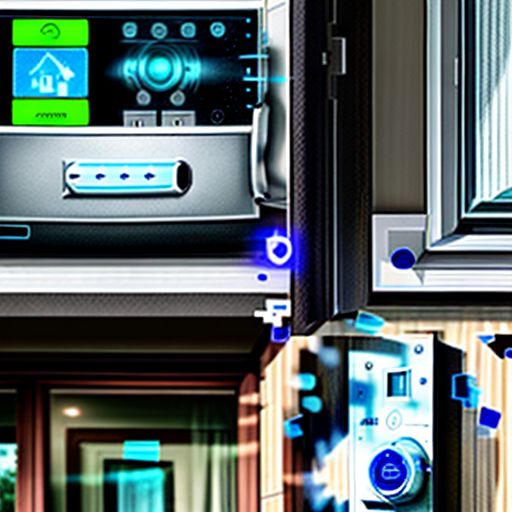Feeling safe and secure in your own home is a basic human need. In today’s world, achieving that peace of mind often involves investing in a reliable home security system. But with so many options available, finding the best home security system to meet your specific needs can feel overwhelming. That’s where this guide comes in. We’ll break down everything you need to know about top-rated home security systems, including key features, costs, and expert insights to help you make an informed decision.
Understanding Your Home Security Needs
Before diving into the specifics of various systems, it’s crucial to assess your individual requirements and any potential security concerns.
Factors to Consider:
- Type of Residence: Do you live in an apartment, condo, or single-family home?
- Size of Property: A larger property may require more extensive coverage.
- Neighborhood Crime Rates: Researching local crime statistics can provide valuable insights.
- Specific Concerns: Are you primarily worried about intrusion, fire, environmental hazards, or a combination of these?
- Budget: Home security systems range widely in price, so determine a realistic budget beforehand.
security.yougaming.xyz/wp-content/uploads/2024/07/home-security-system-components-66922e.jpg" alt="Home Security System Components" width="512" height="512">Home Security System Components
Key Features of Top-Rated Home Security Systems
Top-rated home security systems often share several core features:
1. Professional Monitoring:
This feature ensures that a monitoring center receives alerts from your system in case of an emergency, such as a break-in, fire, or carbon monoxide detection. Trained professionals will then contact you and dispatch the appropriate authorities if necessary.
Why it matters: Professional monitoring provides an added layer of security and peace of mind, especially when you’re away from home.
2. Wireless Connectivity:
Modern systems utilize wireless technology, eliminating the need for cumbersome wiring and making installation easier. Look for systems compatible with Wi-Fi, Bluetooth, Z-Wave, or Zigbee protocols.
Why it matters: Wireless connectivity offers flexibility, scalability, and remote control options.
3. Smart Home Integration:
Many of today’s leading home security systems seamlessly integrate with smart home platforms like Amazon Alexa, Google Assistant, and Apple HomeKit. This integration allows you to control various aspects of your security system using voice commands or through a centralized app.
Why it matters: Smart home integration enhances convenience, automation, and personalized control.
4. Variety of Sensors and Detectors:
Top-rated systems offer various sensors and detectors to protect your home comprehensively. These can include:
- Door and Window Sensors: Detect unauthorized entry.
- Motion Sensors: Trigger alerts when movement is detected in designated areas.
- Glass Break Sensors: Identify the sound of breaking glass.
- Smoke and Fire Detectors: Provide early warnings in case of fire.
- Carbon Monoxide Detectors: Detect this odorless, colorless, and deadly gas.
- Flood and Freeze Sensors: Monitor for water leaks and freezing temperatures.
5. Video Surveillance:
Security cameras have become increasingly popular, offering live video feeds, motion-activated recording, and even two-way audio communication.
Why it matters: Video surveillance provides visual evidence, deters crime, and allows you to monitor your property remotely.
Exploring Different Types of Home Security Systems
1. DIY Home Security Systems:
DIY systems offer affordability and flexibility for homeowners comfortable with installation and setup. They often come with wireless components and user-friendly mobile apps for management.
Pros: Cost-effective, customizable, easy installation.
Cons: Limited professional monitoring options, potential for technical issues.
2. Professionally Installed and Monitored Systems:
These systems are installed and monitored by trained technicians from reputable security companies. They often come with more advanced features and 24/7 professional monitoring services.
Pros: Professional installation, comprehensive monitoring, advanced features.
Cons: Higher upfront costs, potential contracts required.
3. Self-Monitored Systems:
These systems allow homeowners to monitor their homes themselves via mobile apps and receive alerts directly on their smartphones.
Pros: No monthly fees for professional monitoring, flexibility, control over data.
Cons: Requires constant vigilance, potential delays in emergency response.
Making the Decision: Choosing the Right System
Selecting the top-rated home security system boils down to your specific needs, priorities, and budget. Consider these factors:
- Level of Protection: Evaluate your security concerns and desired features.
- Budget: Determine a realistic budget for equipment and potential monitoring fees.
- Lifestyle: Consider your comfort level with technology and DIY installation.
- Reviews and Ratings: Research reputable brands and read customer reviews.
Conclusion
Finding the top-rated home security system is an investment in your peace of mind and the safety of your loved ones. By carefully considering your needs, researching available options, and understanding the key features, you can make an informed decision that provides the protection and security you deserve.
